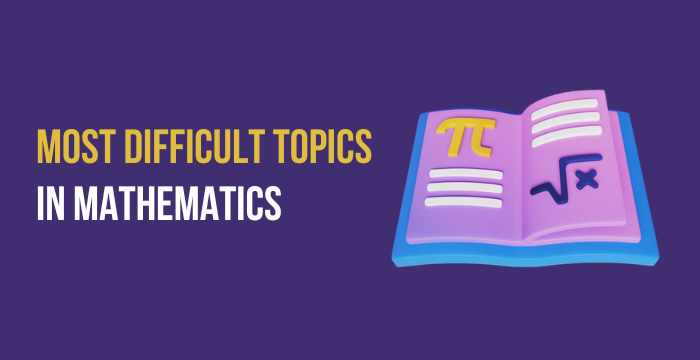
Mathematics generally handles shape, order, quantity and logic daily. Mathematics deals with structures, relationships and orders, which has evolved from different primitive methods, such as measuring, counting, and detecting different types of objects. Mathematics deals with various types of reasoning based on logic and numeric calculation. Mathematics is essential for every individual as it helps increase creative thinking that can be used in various fields in the real world. Mathematics is used in proving different types of hypotheses, controlling and testing designs, identifying patterns and evaluating data, determining absolutes and solving various problems. These are some of the significant skills developed with the help of mathematics.
Mathematics is an integral part of the student curriculum in any part of the world, and offer a clear picture that whether the subject is in favour or not of the student. It is widely noticed that maths is considered one of the most challenging subjects for many students worldwide. This is due to the perception of the student that mathematics results in twisting their brains and crates confusion among them. Mathematics is a very vast field of study and is comprised of different types of concepts and topics. However, there are some topics in mathematics which are considered very difficult by the students and also by professionals.
Ten most challenging topics in mathematics:
- Algebra: Algebra is considered one of the most challenging topics in mathematics that help in the studies of different types of symbols and also the different rules which help in controlling these symbols. In the case of elementary algebra, the symbols written in Greek or Latin languages demonstrate quantities with no specific values. Algebra is a branch of mathematics in which symbols are used in place of numbers, which are used for formal and arithmetic calculations.
- Logic: Logic is considered the base of mathematics, which helps in mathematical logic and overall mathematics. Logic takes into account all the valid arguments regarding a topic. It helps in providing a piece of evidence or proof regarding a subject or topic.
- Calculus: Calculus is a branch of the discipline investigating the relative rate of change, also known as differential calculus. It also helps summate infinite particles to find a conclusive result, known as integral calculus. The calculus study incorporates different types of variables, integrals, derivatives, real numbers, and limit functions. It also includes the study of analysis and change concepts.
- Topology and geometry: Geometry is the study of different figures, such as circles and cubes, then generalised. Geometry is one of the most practical branches of mathematics and is related to shapes, volumes, figures and sizes. Geometry generally focuses on understanding polygons., shapes and objects present in multiple dimensions. Geometry is essential as it helps create different real-life shapes and objects. Topography, on the other hand, deals with the quality of the objects and does not change even when the shape and size of the objects are bent in different dimensions in the same manner. It deals with the deformation of different geometrical shapes due to different factors.
- Combinatory: This branch of mathematics helps in analysing different discrete objects in general. Counting different objects is one of the most crucial elements in combinatory mathematics. Furthermore, it is also considered one of the most conclusive procedures to examine whether the requirement has been fulfilled. It helps in the additional construction of and identification of different objects that need to be carried forward. The number in combinations, such as arrays, groups and designs related to a specific type, creates significant combinator problems. The presence of easy combination rules can also increase the complexity of enumeration.
- Number theory: Number theory is that branch of mathematics which helps study positive integrals. The principles related to number theory begin with introducing addition, multiplication, subtraction, and division. Furthermore, it increases to advanced stages, which include game theory, cryptography and more. As number theory is considered one of the most ancient mathematical disciplines in the world, it is also known as higher arithmetic. The number theory includes the study of both natural numbers and whole numbers. This makes the prime number-related topic simple at the beginning; however, it becomes challenging for the students in later stages.
- Differential equation and dynamical systems: The differential equation refers to those mathematical expressions which carry unknown functions and their relative derivatives. On the other hand, dynamic systems consist of fixed rules, which depend on geometrical plans and time. Some common examples of dynamic systems are the swinging of a pendulum, flowing water through the pipe and the total number of fishes in a given lake.
- Mathematical physics: Mathematics physics refers to using mathematics to solve physics-related problems. Moreover, it also helps develop different mathematical processes which can be used to form different types of physics-related theories.
- Computation: mathematics and computers are very much related to each other, using different algorithms, data structures, and scientific computing. The use of algorithms makes use of the different types of problem-solving processes present in mathematics, science and engineering collectively.
- Signal processing and information theory: Information theory is a part of applied mathematics and electrical engineering, which helps quantify any information type. The information theory was majorly developed to identify the natural constraints that can help compress and transfer a given amount of data accurately. Signal processing refers to the process of analysis, manipulation and interpretation of signals. Various types of sounds, images, and biological signs such as ECG and radar are some of the common examples of signals. The signal processing includes filtration, reconstruction, storage and analysis of the signal. The signal processing is essential as it helps extract the various important information from noise and compression.
Conclusion
Maths is a vast and abstract subject, making it difficult for most students. The range of mathematics that deals with arithmetic is considered more complex. However, enjoying the subject can help make mathematics fun for the students. Moreover, constant practice in mathematics is the key to gaining success in maths in professional life for the students and the professionals in their lives.


